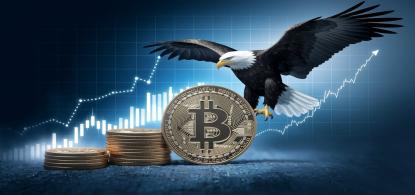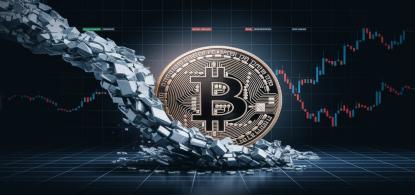
How Will The Bitcoin Price React To Donald Trump’s Reciprocal Tariffs?
How Will The Bitcoin Price React To Donald Trump’s Reciprocal Tariffs?
Summary
Bitcoin was one of the most contentious financial products in the past couple of years for retail and institutional investors. Its decentralized platform, limited supply, and inflation-hedging property make it a superior choice over other investment options and currencies. Increasing economic uncertainty around the world is compelling more investors to utilize Bitcoin as a way to preserve their wealth.
During trade wars, stock market crashes, or inflation, Bitcoin is a haven investment. Most investors believe that it is safer to keep value than traditional markets. Institutional investors such as banks and hedge funds have also started investing in Bitcoin as an addition to their portfolios, which increases the demand. Companies such as Tesla and MicroStrategy have invested in Bitcoin, which shows growing confidence in its prospect.
However, Bitcoin is very volatile. Its value could change either up or down depending on the investors' mood, market forces, and government policy. Some governments have prohibited or outlawed Bitcoin transactions, which would affect its use. Additionally, an overvaluation of the U.S. dollar or stringent regulation could slow down the growth of Bitcoin in the financial market.
Introduction
Bitcoin is characterized by its volatility. It responds to global economic and political incidents unpredictably. A notable one among them is former U.S. President Donald Trump's trade policy, notably his concept of reciprocal tariffs. However, what are reciprocal tariffs and how would they impact Bitcoin's price?
To put it simply, reciprocal tariffs mean that if any country imposes very high tariffs against U.S. goods, then America will, in turn, impose the same on the products of the respective country. Trump has always been a proponent of implementing such a policy for safeguarding American businesses. Some are convinced that tariffs strengthen the economy of America, but other people feel tariffs can trigger trade wars, fuel inflation, and economic turmoil.
Bitcoin tends to be utilized as an economic instability hedge. If old markets fail during times of trade tensions, then investors will shift to alternative investments such as Bitcoin. If Trump's tariffs result in economic instability, then Bitcoin will gain value, and individuals will put their money in virtual currency. Some risks may arise, too. If tariffs result in slowing finances across the globe, then investors will trade Bitcoin for money, and prices will decrease.
And one more is the response of governments to Bitcoin as a reaction to tariffs. If Trump's policy of tariffs stabilizes fiat, then some investors will view Bitcoin as a haven. But if regulatory authorities subject crypto to increased control for economic stabilization, then the price of Bitcoin can underperform.
In the long run, Bitcoin's response to Trump's retaliatory tariffs will be determined by how they affect world trade, inflation, and investor sentiment. While some anticipate that Bitcoin will appreciate due to uncertainty, others anticipate that it will depreciate due to decreased market liquidity. The next few months will be important in determining how these policies shape Bitcoin's future.
Table of Contents:
-
Will Bitcoin Benefit as a Safe Haven Asset?
-
Will Tariffs Lead to Increased Inflation and Push BTC Higher?
-
Can Trade War Fears Boost Bitcoin Adoption?
-
How Will the Stock Market’s Reaction Influence Bitcoin?
-
Will the U.S. Dollar’s Strength or Weakness Affect Bitcoin?
-
Will Chinese Investors Use Bitcoin to Bypass Trade Restrictions?
-
Can Bitcoin Benefit from Global Economic Instability?
-
Will Institutional Investors Increase Their Bitcoin Holdings?
-
Conclusion
-
Frequently Asked Questions (FAQ's)
Will Bitcoin Benefit as a Safe Haven Asset?
A safe haven asset is something that people invest in when there is financial distress. The long-standing safe haven has been gold. However, these days, many people believe that Bitcoin can be a safe haven too.
Bitcoin is not managed by a government or bank. It is thus attractive when there is a crash in stock markets or inflation rises. In economic downturns, investors want to move their money into investments that will hold value. Since Bitcoin has a finite supply, it is thought that it can be used as "digital gold."
But Bitcoin is extremely volatile. Its price can surge or drop significantly in a very short time. This makes some experts question whether it is indeed a safe haven. In earlier financial crises, Bitcoin has sometimes risen, while sometimes it fell along with stocks.
Even so, as more people start to believe in Bitcoin, the safe-haven nature of Bitcoin will grow. As financial instability builds globally, Bitcoin can anticipate more investors looking for refuge from traditional market risk.
Will Tariffs Lead to Increased Inflation and Push BTC Higher?
Tariffs are extra taxes that are put on foreign products. When countries impose tariffs, the price of the products tends to rise because companies pass on the extra cost to consumers. This might lead to inflation, where everything becomes expensive.
As inflation grows, the amount of money one holds loses its purchasing power. For their investments, investors find the assets which neither lose value over time nor devalue, thereby preserving the assets. Over history, such an option has been gold but present-day's counterpart is Bitcoin (BTC). With only a fixed number of Bitcoin coins there can ever be—21 million of them, so many believe, it will function as a hedge against inflation.
In the past, the value of Bitcoin has generally appreciated during periods of economic uncertainty. If tariffs create over-the-top inflation, further investors will naturally turn to BTC and its price will be even greater. But if inflation becomes over-the-top and economies slow down, people can spend their Bitcoin on day-to-day expenses and prices will decrease.
Can Trade War Fears Boost Bitcoin Adoption?
A trade war is when countries impose high tariffs on imports. This creates uncertainty in the economy because companies must contend with higher costs, and consumers end up paying more for products. When people worry about the economy, they look for other ways to protect their money.
One of the alternatives is Bitcoin (BTC). Being decentralized and not controlled by any government, Bitcoin is viewed by some investors as a safe-haven asset during economic uncertainty. Even more people may start using Bitcoin to hold their assets or make cross-border transactions without any restriction if trade war fears worsen.
Generally, fear of a trade war would push more individuals to Bitcoin, propelling its use. But how much it expands is up to the reaction of the world economies and whether Bitcoin remains to gain trust as a safe asset.
How Will the Stock Market’s Reaction Influence Bitcoin?
Following are some of how the reaction of the stock market can affect Bitcoin:
1. Stock Market Crash Could Drive Bitcoin Higher
If the stock market collapses because of economic problems, investors may turn their attention to other assets such as Bitcoin. Because Bitcoin is decentralized and not governed by governments, individuals may view it as a haven for their money. This can boost demand and push the price of Bitcoin higher.
2. Stock Market Crash May Also Take Bitcoin Down
At times, during a crash, investors panic-sell and dump all, including Bitcoin, to get cash. Historically, even Bitcoin has plummeted along with stocks because major investors sell off their crypto holdings to meet other losses.
3. Good Stock Market Can Also Slow Bitcoin Rise
When the stock market is going well, investors will prefer to invest in the conventional way through bonds and shares. They will consider Bitcoin risky and avoid it. This could slow the development of Bitcoin and stabilize it or even decrease its value.
4. Volatility in the Stock Market Will Make More Traders Turn to Bitcoin
If markets for stocks are too volatile, short-term traders can fall back on other markets like Bitcoin because of the volatility in its price. Increased trading activity can lead to higher prices for Bitcoin.
Will the U.S. Dollar’s Strength or Weakness Affect Bitcoin?
The USD (United States dollar) and BTC (Bitcoin) share a history that is inversely related, i.e., wherever one increases, the other decreases. This is how the weakness or strength of the dollar influences Bitcoin:
1. When The U.S. Dollar Weakens, Bitcoin May Increase
When the dollar loses value by inflation, debt, or economic issues, investors look for alternative stores of value. Since Bitcoin is supply-inelastic and decentralized, for most investors, it serves as a de-dollarization hedge. More, thus, would invest in Bitcoin and propel its price up.
2. When The US Dollar Is Strong, Bitcoin May Trail Behind
When the dollar is strong, individuals have greater faith in conventional financial systems. With a high USD, there is low inflation and high interest rates, and hence, cash savings and bonds are better than Bitcoin. That can lower demand for Bitcoin, which lowers prices.
3. Global Demand for USD Impacts Bitcoin Adoption
As the world reserve currency, the USD holds sway over the global markets. If nations are short of dollars or in an economic crisis, they can turn to Bitcoin as an alternative financial system. But if the dollar is unchallenged, the evolution of Bitcoin will be stifled.
Will Chinese Investors Use Bitcoin to Bypass Trade Restrictions?
China has strict financial and trade rules, especially under economic tensions like trade wars. In instances when they are threatened with trade prohibitions, naturally, some Chinese investors will find ways to move money across borders without interference from the state. Bitcoin (BTC) is one of them.
1. Bitcoin Offers a Borderless Option
Bitcoin is not connected to traditional banking institutions and is decentralized. This, as such, gives it the leverage of being attractive to investors who want to avoid capital controls or trade barriers. By using Bitcoin, they can conduct cross-border payments without the use of banks and without government authority permission.
2. Government Crackdowns Might Make It Challenging
China banned crypto trading on various occasions and closed Bitcoin exchanges to stem capital flight. If Chinese investors try to utilize Bitcoin to avoid trade restrictions, the government will keep ratcheting up regulation, limiting access to crypto markets further.
3. Stablecoins Could Be a Safer Alternative
To act as a substitute for Bitcoin, others employ stablecoins like USDT (Tether), which is pegged to the U.S. dollar. They are secure and convenient to create international transfers but don't come with the price volatility of Bitcoin.
4. International Crypto Exchanges Still Remain Accessible
Notwithstanding China's prohibitions, most Chinese investors continue to access Bitcoin via offshore exchanges, peer-to-peer (P2P) trading, and decentralized finance (DeFi) platforms. Provided that these channels remain accessible, Bitcoin is a viable means of evading trade bans.
Can Bitcoin Benefit from Global Economic Instability?
Global economic instability arises when countries face financial crises, inflation, trade wars, or market crashes. During such times, investors look for safe assets in which they can invest their funds to secure them. Bitcoin (BTC) has typically served as an alternative investment because it is decentralized and unregulated by any government.
By collapsing conventional markets, some people have invested their cash in Bitcoin and hope that it will hold value longer than in the stock market or their country's national currency. That could increase demand and push Bitcoin prices higher. For instance, at times of banking crisis or hyperinflation, the overwhelming majority of investors have invested in Bitcoin as an insurance policy.
Nevertheless, Bitcoin is also extremely volatile. If economic uncertainty leads to panic and individuals selling assets for cash, then the price of Bitcoin can go down rather than up. In addition, policy by governments might affect the employment of Bitcoin as a haven.
Will Institutional Investors Increase Their Bitcoin Holdings?
Institutional investors are big financial institutions like banks, hedge funds, and corporations. A few of them have started investing in Bitcoin (BTC) in recent years as they think it is a worthwhile asset. If more institutions invest in Bitcoin, its price and adoption can further grow.
One of the reasons institutions have been investing in Bitcoin is that it is limited in supply, much like gold. They also consider it a hedge against inflation and a haven from economic crises. Tesla and MicroStrategy already have Bitcoin on their balance sheets, which indicates faith in its future.
However, there are still some institutions that are reluctant because Bitcoin is highly volatile and subject to government regulation. If the regulations become tighter, some investors will be reluctant to invest more. But if Bitcoin gets better regulation and greater acceptance, institutional investment will rise.
In general, institutional investors are slowly incorporating Bitcoin into their portfolios, and the trend can continue if Bitcoin stabilizes and gains more trust in the financial market.
Conclusion
Bitcoin has proved to be a favorite choice among investors in volatile economic periods. It has found favor among various investors, institutions, as a store of value and hedge against inflation. It is because it is not influenced by the hand of government due to being a decentralized and untamed phenomenon that it represents a substitute to fiat financial systems.
When the global economy is in trouble, whether in the form of trade wars, inflation, or a crash in the stock market, people will take cover in safe havens. Some opt for gold, but some opt for Bitcoin. Bitcoin has been the focus of attention in recent years as "digital gold" because of its limited supply and the fact that it can be used as a borderless currency. If economic turmoil continues, then Bitcoin will see growing adoption and investment, especially by institutional investors.
However, Bitcoin is very volatile. Its price can shoot up or go down quickly based on investor opinions, market patterns, and policies of the government. Although there are countries that have embraced Bitcoin, there are also countries that have imposed tight regulations on its use. Institutional investors are gradually increasing their portfolios, but others are still hesitant because of issues related to regulations.
Frequently Asked Questions (FAQ's)
Que: Why do others put money into Bitcoin?
Ans: Other people put money into Bitcoin as it is decentralized, not readily available in terms of supply, and can be used as an inflation hedge. It is seen as a long-term investment as its use continues to increase.
Que: Can the price of Bitcoin rise even during economic recessions?
Ans: Yes, the value of Bitcoin does rise when economies experience crises, via inflation or stock market collapses. When other markets become unstable, investors prefer to use Bitcoin as a store of value.
Que: Why do institutional investors purchase Bitcoin?
Ans: Institutional investors purchase Bitcoin because they consider it a valuable asset like gold. Tesla and MicroStrategy have already invested in Bitcoin as diversifying assets.
Que: Is Bitcoin extremely volatile?
Ans: Yes, the price of Bitcoin is extremely volatile. It can rise or fall rapidly based on market sentiment, investor attitude, and government policies. This makes it a high-risk but potentially high-return investment.
Que: Can government regulations influence Bitcoin?
Ans: Yes, government policies and regulations can influence the use and value of Bitcoin. While there are countries with hard crypto policies, others encourage Bitcoin investing and trading.





